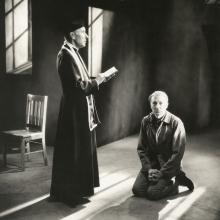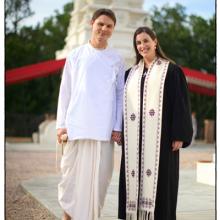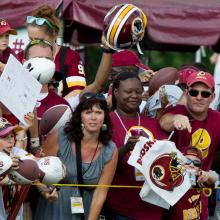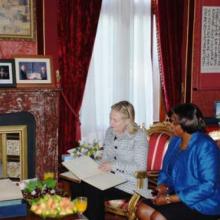Baptist
Manhattan’s District Attorney, Alvin Bragg, is best known these days for leading the probe of whether former president Donald Trump and his company broke state laws in 2016 to buy Stormy Daniels’ silence about an alleged affair.
“Many of the findings of the commission’s year-long investigation were disturbing, and led commission members to question whether the death penalty can be administered in a way that ensures no innocent person is put to death,” according to the in-depth report.
A recent Washington Post profile of Karen Pence mentioned that her husband, Vice President Mike Pence, never eats alone with another woman or goes without her to events where alcohol is being served.
Twitter erupted with outrage and ridicule.
But the Indiana Republican’s practice is not unusual in many conservative Christian circles. As Emma Green pointed out in The Atlantic, it likely stems from something called “the Billy Graham Rule,” named for the 98-year-old international evangelist. Nor is it that much different in intention from the practices of conservative Jews and Muslims.
“It seems like most congregations are eager for somebody else to do the work of reconciliation,” said Scott McConnell, executive director of LifeWay Research, “rather than embrace it for themselves.”
The vast majority of pastors (90 percent) said their churches would welcome a sermon about racial reconciliation. But almost three-quarters of pastors — 73 percent — say they have not been encouraged by church leaders to preach about reconciliation. A quarter (26 percent) said they have been urged to address the issue from the pulpit.
In her sermon on the last Sunday of Black History Month, the Rev. Maria Swearingen preached about her belief that black lives, “queer lives,” and immigrant lives matter.
And since it also was Transfiguration Sunday, she pointed to the story in the Gospel of Matthew where God declared Jesus “beloved.” That is a term, she said, that can be used for everyone.
The neighborhood has long been home to numerous historic and not-so-historic houses of worship of nearly every size and type. Here you can find congregations of Muslims, Hebrew Israelites, AMEs, Baptists, Presbyterians, Pentecostals, and everything else in between.
So who cares if a few churches have to be razed to make Harlem “great again,” right?
I do.
A survey released last week by the Pew Research Center suggested a very different view of the presidential actions, especially among white Protestant Christians.
There was strong support among white evangelical Protestants, with more than three-quarters (76 percent) saying they approve of the policies outlined in Trump’s order. Among white mainline Protestants, 50 percent approved.
Many Christians now are asking the question Helena Leffingwell of Arlington, Texas – not a pastor or ministry leader, just a regular member of Gateway Church, a nondenominational megachurch – put into words: “How can we see things so differently?”
When some claim that Southern Baptists are partisan hacks, Moore finds a way to challenge the Republican establishment while holding the line on cornerstone conservative issues such as abortion and gay marriage.
On Monday, Oct. 31, in Sweden, Pope Francis will take part in an ecumenical service commemorating the beginning of the Protestant Reformation’s 500th year.
It is stunning to think the start of this momentous anniversary features a visit from the Roman pope.
And it raises a question: Does the Reformation still matter?

Image via BlueDesign/Shutterstock.com
In 2013, Francis provoked an outcry from economic conservatives with the release of his apostolic exhortation, “Evangelii Gaudium (The Joy of the Gospel),” which was widely seen as his personal manifesto. In it, Francis said the world could no longer trust “the unseen forces and the invisible hand of the market,” and called for ecclesiastical renewal and compassion for the poor.
Cox, who taught at Harvard for 50 years, dedicated his latest book to the pope because they share a concern about what Francis called a “deified market” that’s creating “new idols.”

Image via Everett Collection / Shutterstock.com
Judge William Mallory enjoys handing out creative sentences from his bench over at the Hamilton County Courthouse.
But the one he meted out in his Municipal Court room Wednesday wasn’t even his idea.
And boy, oh boy did he like it.
The findings show that as many as 45 percent of Americans will look at the church brand on the sign out front — Catholic or Baptist or Methodist or whatever — and drive past, thinking it is “not for me.”
And yet, McConnell said, the survey reveals an openness in most people — if not a very theologically deep one — to stopping by, even if they declare no religious identity, the “nones.”
“Many people view a church like the ice cream parlor down the road. They think, ‘When I’m in the mood, I can go.’ Church leaders can take it as good news: People haven’t ruled them out. But they have to be a little unsettled at how little people are thinking about this,” said McConnell.
Sen. Marco Rubio (R-Fla.), who is expected to launch his presidential campaign April 13, often talks about faith and wrote about his religious convictions in his 2012 book, An American Son: A Memoir.
Here are five faith facts about this Catholic son of Cuban immigrants who has also found comfort in Mormonism and a Southern Baptist church:
1. He was once a serious young Mormon.
Rubio’s parents baptized him Catholic and he is now a practicing Catholic, but when he was 8, his family moved from South Florida to Las Vegas, where his mother attributed the wholesomeness of the neighborhood to the influence of the Mormon Church. Young Rubio was baptized again, this time in the Church of Jesus Christ of Latter-day Saints. He spent three years as a Mormon, upheld its teachings more enthusiastically than his parents, and chided his father for working as a bartender, a no-no for Mormons who abstain from alcohol.
2. He frequents a Southern Baptist megachurch.
Rubio and his wife Jeannette often visit Miami’s Christ Fellowship, a Southern Baptist congregation the couple appreciates for its strong preaching and children’s programs. Rubio has donated at least $50,000 to the church, which he attended almost exclusively from 2000 to 2004. But he now finds his religious home in Catholic churches in Washington, D.C. and Florida. In his memoir, Rubio writes that he will go with his family to Christ Fellowship on Saturday nights, and Mass on Sundays at St. Louis Catholic Church. His children have received First Holy Communion.
A Russian pastor whose grandfather was killed for being a Christian toured the U.S. recently, studying church ministries and providing a rare, first-person look at Russia’s complex religious landscape after widespread persecution ended.
During Victor Ignatenkov’s youth under the Soviet regime, Christians could meet only for worship.
No Sunday school.
No midweek Bible study.
And definitely no proselytizing.
Today, Ignatenkov, 59, said he’s free to lead whatever activities he wants as pastor of the Central Baptist Church in his hometown of Smolensk — a city situated between the capitals of Russia and Ukraine — and as regional bishop for the Russian Union of Evangelical Christians-Baptist. The union is a group of evangelical Protestant churches that began emerging in Russia about 150 years ago as an alternative to the Russian Orthodox establishment.
Christianity is full of labels.
Does caring about the environment make me a Liberal Christian?
Does opposing to the death penalty make me a Leftist Christian?
Does believing that women can preach make me a Christian Feminist?
Does believing in anti-violence make me a Christian Pacifist?
Does taking an anti-war stance make me an Anabaptist Christian?
Acting President Oleksandr Turchynov is neither Ukrainian Orthodox nor Eastern Rite Catholic, and that may be the key to his success at a time when fissures between East and West are threatening to split the country, analysts say.
“It plays against the stereotype that the pro-democracy, pro-Western protesters are mostly Ukrainian-speaking Catholics,” said Vitaly Chernetsky, a professor of Slavic languages at the University of Kansas and president of the Massachusetts-based American Association for Ukrainian Studies.
Turchynov, a Baptist pastor, became Ukraine’s interim head of state on Sunday, a day after President Viktor Yanukovych was forced out amid a barrage of criticism from protesters who occupied the capital’s central square, known as the Maidan in Ukrainian, for the past three months.
IT IS EASY, and a lot more comfortable, to identify and name dysfunction outside your family. It’s an entirely different endeavor, however, to label inappropriate behavior in your own home.
That’s the situation I find myself in as a lifelong member of the black Baptist tradition—one that, by and large, refuses to ordain women ministers and call them into the pastorate. I can no longer keep silent. My spirit won’t let me be quiet about a system where injustice is nurtured.
Women are the backbone of African- American Baptist congregational life, yet they traditionally have been blocked from ordained ministry. I’ve watched this for years in Kentucky where I was born, raised, and currently live; experienced it in other places where I have resided; and heard the same story from Baptist female colleagues in ministry around the country. The same is also true in many white Baptist congregations, such as those affiliated with the Southern Baptist tradition. But I’m speaking here about the world I know personally.
Ironically, some of these black congregations and pastors who are unwilling to honor God’s call on the lives of women seeking ordination are the same ones who are quick to name a plethora of injustices perpetrated against black people as a race, and to demand quick resolution.
Doors for women called to preach the gospel of Jesus Christ have opened a little in recent decades. More women are being licensed, the precursor to ordination in the Baptist structure. But the process usually stops there, and women are left patiently waiting to be blessed into the fold. These “ladies in waiting” are allowed to lead ministries, teach, and occasionally preach, but rarely permitted to go beyond that.
Growing up Baptist, J. Dana Trent heard plenty of warnings about interfaith romance.
Marrying the wrong person — known as being “unequally yoked” — could ruin your faith and your marriage.
But three years after marrying a former Hindu monk, Trent says she’s a better Christian than ever.
“I had become complacent in my Christianity,” said Trent, an ordained Baptist minister. “Now my religion and spirituality have become much more integrated in my life.”
The Oneida Indian Nation’s campaign against the Washington pro football club’s team name picked up new supporters this week when more than two dozen clergy in the Washington region committed to taking the fight to their pulpits.
“Black clergy have been the conscience of America,” Oneida Nation representative Ray Halbritter said to a gathering of roughly 40 people on folding chairs in the basement of Plymouth Congregational United Church of Christ. “This is not a fight we could do by ourselves, or should do by ourselves.”
The Rev. Graylan Hagler, senior minister at Plymouth, asked for a show of hands Wednesday to indicate which clergy members in attendance would be willing to preach against what he termed the “R word.” More than a dozen raised their hands. Hagler said that a different dozen committed to the cause at a clergy breakfast meeting Wednesday and that, all told, he has commitments from roughly 100 clergy members to talk to their congregations in coming weeks.
Suzan Johnson Cook, the State Department’s ambassador-at-large for international religious freedom, will announce this week that she is resigning after 17 months on the job, according to two sources familiar with her office.
President Obama nominated the former Baptist minister to serve as his top adviser on protecting religious freedom around the world. When confirmed by the Senate in April 2011, she became the first woman and the first African-American in the position, which had been held by two people before her.
Obama had been criticized for taking too much time after his own swearing-in to nominate a religious freedom ambassador, a position created by the International Religious Freedom Act of 1998.

















